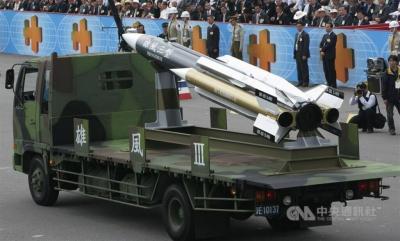Environmental and fishery groups yesterday raised concerns that the official map of offshore wind farming red zones excludes near-shore areas, potentially “sacrificing” fishing off the west coast and Taiwanese humpback dolphin habitats.
The Bureau of Energy last month released a finalized map of restricted zones for offshore wind development detailing sensitive areas for shipping lanes, fisheries and important habitats.
However, marine environments should be protected, even while transitioning to more sustainable energy sources, a coalition of groups told a news conference yesterday.
Developing marine resources should not override the Spatial Planning Act (國土計畫法) at the expense of west coast fisheries, they added.
The map should include offshore regions as defined in the Coastal Zone Management Act (海岸管理法), Taiwan Ocean and Environmental Sustainability Law Center director Chung Han-shu (鍾瀚樞) said.
Waters up to 8 nautical miles (14.8km) from shore should be considered highly sensitive zones where construction of wind farms is banned, Chung said.
Additionally, priority should be given to developing wind farms that were not allocated capacity during phase 2, he said.
Compliance assessments of potential developers should evaluate their commitment to environmental and social responsibilities, while developers should be responsible for submitting designs that ensure coexistence with the fishing industry, Chung added.
Three islets off northeastern Taiwan were classified as restricted zones, but little of the west coast is protected, Yunlin Offshore Fishers’ Association chairman Lee Ping-shun (李平順) said.
Developers should be barred from waters 8 nautical miles offshore and 30m deep to protect the livelihoods of fishers, Lee said.
Commenting on the social dynamics behind marine development, National Taiwan University Department of Anthropology associate professor Lu Hsin-yi (呂欣怡) said that fishers view the ocean as “marine farmland” that must be irrigated to ensure its sustainable use for generations.
If newcomers wish to use this “farmland,” they must respect the rights and wisdom of traditional fishing communities, she added.
In addition, coastal fisheries provide Taiwan’s residents with highly accessible and nutritious food, making the industry not only the livelihood of many coastal communities, but also indispensable to the nation’s food security, Lu said.
Changhua Environmental Protection Union executive director Shih Yueh-ying (施月英) raised additional concerns about their impact on Taiwanese humpback dolphins’ habitats, as allowing construction in waterways would limit their movement into certain areas.
“At low tide, white dolphins might become stranded in intertidal zones,” she said, calling on the Ocean Conservation Administration to amend its development map to prioritize areas outside of major channels.
As for the areas left unrestricted, they could be handed over to developers to use at will, potentially infringing the original intent of the Renewable Energy Development Act (再生能源發展條例), Wild At Heart Legal Defense Association researcher Kuo Chia-wen (郭佳雯) said.
Without sufficient ecological research, there cannot be a comprehensive plan for sea use, Kuo said, calling on the bureau to include environmental compensation and protection measures in developer contracts to ensure that they fulfill their social responsibilities.
The Ocean Affairs Council should be responsible for reviewing usage of marine areas, the groups said, suggesting that it reference international marine zoning standards to ensure the coexistence of fishing and renewable energy.
Additional reporting by Wu Meng-chieh

STATS: Taiwan’s average life expectancy of 80.77 years was lower than that of Japan, Singapore and South Korea, but higher than in China, Malaysia and Indonesia Taiwan’s average life expectancy last year increased to 80.77 years, but was still not back to its pre-COVID-19 pandemic peak of 81.32 years in 2020, the Ministry of the Interior said yesterday. The average life expectancy last year increased the 0.54 years from 2023, the ministry said in a statement. For men and women, the average life expectancy last year was 77.42 years and 84.30 years respectively, up 0.48 years and 0.56 years from the previous year. Taiwan’s average life expectancy peaked at 81.32 years in 2020, as the nation was relatively unaffected by the pandemic that year. The metric

Taiwan High Speed Rail Corp. (THSRC) plans to ease strained capacity during peak hours by introducing new fare rules restricting passengers traveling without reserved seats in 2026, company Chairman Shih Che (史哲) said Wednesday. THSRC needs to tackle its capacity issue because there have been several occasions where passengers holding tickets with reserved seats did not make it onto their train in stations packed with individuals traveling without a reserved seat, Shih told reporters in a joint interview in Taipei. Non-reserved seats allow travelers maximum flexibility, but it has led to issues relating to quality of service and safety concerns, especially during

A magnitude 5.1 earthquake struck Chiayi County at 4:37pm today, the Central Weather Administration (CWA) said. The hypocenter was 36.3km southeast of Chiayi County Hall at a depth of 10.4km, CWA data showed. There were no immediate reports of damage resulting from the quake. The intensity of the quake, which gauges the actual effect of a seismic event, measured 4 in Chiayi County, Tainan and Kaohsiung on Taiwan's seven-tier intensity scale, the data showed. The quake had an intensity of 3 in Chiayi City and Yunlin County, while it was measured as 2 in Pingtung, Taitung, Hualien, Changhua, Nantou and Penghu counties, the data

The Supreme Court today rejected an appeal filed by former Air Force officer Shih Chun-cheng (史濬程), convicted of Chinese Communist Party (CCP) espionage, finalizing his sentence at two years and two months for contravening the National Security Act (國家安全法). His other ruling, a ten-month sentence for an additional contravention, was meanwhile overturned and sent to the Taichung branch of the High Court for retrial, the Supreme Court said today. Prosecutors have been notified as Shih is considered a flight risk. Shih was recruited by Chinese Communist Party (CCP) intelligence officials after his retirement in 2008 and appointed as a supervisor